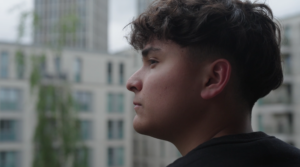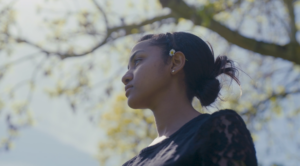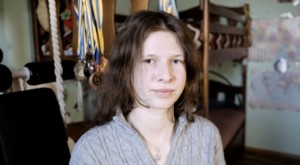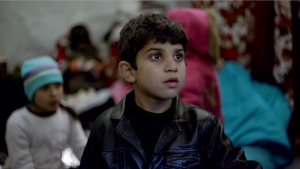Transcript
Refugee Stories: Obaida
Obaida Hi.
Shazia Hi. Are you okay?
Obaida Yeah.
Shazia How are you feeling about this interview?
Obaida Um. Confident.
Obaida My name is Obaida. I'm 21 years old. I'm originally from Syria.
KRAN And we ask questions. Have you. Do you know a friend as a refugee? Have you met a refugee? Most of them. They haven't. No.
Obaida I think the media has a huge impact on the people here in the UK. It doesn't actually show. Like, why are these people leaving their country in the first place? Why they are risking their life, like on the boat and like crossing the Sahara desert, like, you know, the Mediterranean Sea. Why? Like they're doing this at the first place. All they show like this many of refugees have arrived. I now work with KRAM as a youth ambassador to raise young people's voice, especially young refugees and asylum seekers. When I arrived in the UK, I was 15 years old. I had like two different childhoods, one in Syria and one in the country I fled to, which is Jordan. I was six and a half, seven years old when the war started in Syria. I saw, like, you know, my neighbor holding a gun and start shooting, and people. First I thought like, that was just like a joke because I had a gun before, but it was like a plastic toy. So I thought that was like a similar thing. I remember like, I was upstairs with my brother and my brother is quite tall, so he was standing in front of the wall looking outside and like, no, there was a bullet. Like it was that that near piercing his head. It was just above his head. And I was like really shocked. And he was really shocked, but he didn't want to show it to me. And after that, and we never went off like on the roof again. My parents didn't allow us to go near the windows as well. Just like to stay safe. And yeah, that that's the most horrific thing I would say happened. My family is Muslim and we lived in a neighborhood where most of them are atheist. They were against us. My dad, he lived in the neighborhood for 20 years.
He knew everyone of them like they were friends. But once the war started, they just, like now changed completely. And they said like, no, because we know you for like 20 years. We give you a chance to leave first thing in the morning. My dad said we need to leave. So we called the bus. A small van. Yeah, we just left everything behind and moved on. And we went straight to Jordan. And we started our life from zero again. In many countries, Syrians boys like no one girls do work. And at early ages, when I was in Jordan, I used to work when I was 12, 13 years old to support my family. Studying it was pointless for me because I knew there was no future for me. And in Jordan, I used to work in a supermarket where I just tidied up things and like, you know, sell goods and things. And the funny part was, whenever someone like police comes looking for Syrians, I'll just like, pretend I'm a customer or take something and buy it and go out. It was fun lifestyle, but dangerous because anytime I was age of getting arrested and like, you know, I have to pay a bill, I'm pretty sure my family couldn't have afford that. I stayed in Jordan for seven years. My family were registered in the UNHCR. They called us, said like your family name is on the settlement scheme. Would you like to go to America? And we were thinking, yes, of course, like any place where we have a future at least. After one year, Donald Trump happened, he said like, no, no more refugees anymore in America. So we had to cancel that, not us. Like the UNHCR. We didn't have emails, nor letters and letters would take lots of time. So we were just always looking at our one phone. Probably seven months. They called us again and they said, there's a resettlement scheme happening right now. We put your family name on it. So we chose the UK. My parents weren't happy because of the culture difference. They were thinking about UK is like, you know, it's completely different to Jordan and Syria. Even though like, you know that life is expensive and difficult here, but they still have the culture, the like, you know, the religion. But they understood for us, the children like this is our future. When I was in Jordan, I used to watch hours of movies and especially Harry Potter. And so when I, when I heard the UK and England, I was like thinking, oh like, you know, flying brooms and like, you know, magic wands and that's, that's different life like, you know, there and I'll be a part of it. Uh, but unfortunately, when I arrived to the UK, um, none of that was true.
My first impression is like how peaceful the country is. And everyone here is equal. How everyone has here, here has an opportunity to continue the future, to have a better life, a decent life, I would say. That's what every refugee dream of. When. When I arrived, I was thinking probably because my race, my color, which is like completely different to white people, I would find it difficult. If I remember correctly, my first day was going to KRAN, where I studied some English there and elderly man stopped us and said like, where are you from? We were like, we are from Syria. I was really thinking like, you know, something bad will happen. But he said, oh, welcome, and you are here now. You are safe. And I really felt welcomed that day. How can I support this country? Support. Like, you know, the people living in this country. When I was in Jordan, all I thought about is like, you know, having a decent life and never thought of having a luxurious life, having, like, you know, a phone all I wanted, just like, you know, wake up in the morning, have a normal, like, breakfast, go to school, study something I like. When I arrived in the UK, I found all of that when I was in Jordan, I didn't plan anything for my future. But until I arrived to the UK, where I was secured and safe, I start thinking about my future, which is it took me a while to understand how important it is and carrying on with my life. For me, the word refugee means a lot. When I was in Jordan, I was called a refugee. It really annoys me. It's the conception of people have made about refugees. Like refugees are bad. Refugees are like, no, they are taking your job. You know you're the country. But Refugees are just like normal people are looking for shelter for like decent life who couldn't live in their country and they just moved away. And I think this has been in all human nature, like people are just moving around like, you know, for better, better life. If you see someone from a refugee background or if you notice he's he's struggling or she is struggling, just go give him this small motivation like, you know, this small push from you because you don't know what they've been through. But that small smile from your mind, like know, made their day. Who knows? Probably you are the reason. Like they achieve their full potential. So yeah, it's been it's been like in, in the past for me. The UK is my home country now. And to be honest, the home for me is like family and people around me. I would hope when they see things are better in Syria. But now, yeah, I would never go back because I know it will never be the same as before. And here I have found my life and have found my future.








